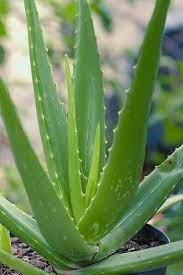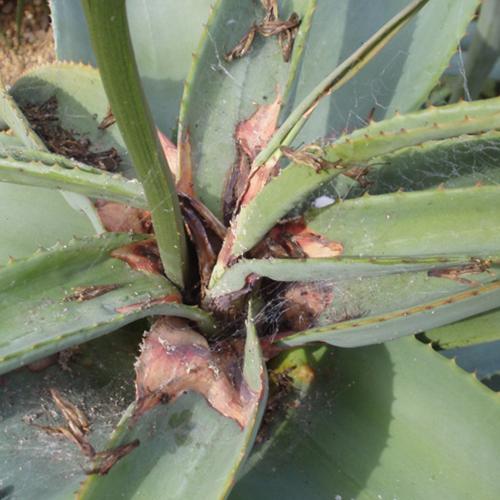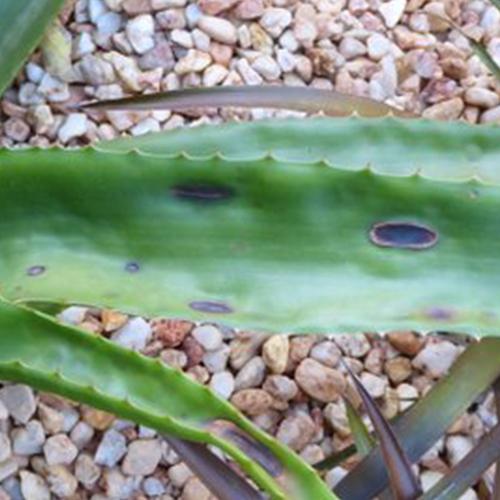Aloe Plant
Aloe (Aloe vera) is a succulent growing 1-3 feet tall, hardy in USDA zones 9-11, with slow growth in well-drained, sandy soil, requiring full sun and low moisture, and it is both edible and medicinal.

Habit
Succulent
Height
1-3 ft
Growth
Slow
Soil
Well-drained, sandy
Shade
Full sun
Moisture
Low
Edible
Yes
Medicinal
Yes
Origin
Africa
Climatic Condition
Arid, Semi-arid
Temperature (°)
18-30
Humidity (%)
50-70%
Potting media
Cactus Soil Mix
Fertilizers
Low Nitrogen, Phosphorus
Watering
Light, Water Sparingly
Plant Weight
50-100 g
Flowering Time
Spring to summer
Soil Ph level
7.0-8.0
Water Ph level
6.5-7.5
Soil EC
1-5 dS/m
Yield Per Plant
Minimal Yield
NPK ratio
10:10:10
life Span
10-12 yrs
Health Benefits
Skin Care(Moisturizing, Healing)
Suggested Grow Media or Potting Mix ?
40% cactus mix, 30% perlite, 30% sand
Suggested Fertigation/Fertilizers
Fertilize every 4-6 weeks with a cactus fertilizer.
Common Diseases and Remedies
Aloe Rust, Root Rot, Mealybugs, Leaf Spot, Anthracnose.
Black or brown spots on leaves, Yellowing, mushy leaves White cottony masses on leaves, Brown or black spots on leaves, Dark sunken lesions on leaves.
Remove affected leaves, ensure good air circulation Improve drainage, reduce watering Wipe with alcohol, neem oil Prune affected areas, neem oil spray Prune affected leaves, improve air circulation
Copper-based fungicides, Fungicides containing metalaxyl, Systemic insecticides like imidacloprid, Copper-based fungicides, Fungicides like thiophanate-methyl.
HEALTH BENEFITS
Aloe vera is well-known for its various health benefits, especially for skin care, but it also offers a range of internal health advantages. Here are some key benefits:
- Skin Health: Aloe vera is often used topically to treat burns, cuts, and minor skin irritations. It helps soothe the skin, reduce inflammation, and speed up healing. Aloe vera gel is also commonly used to hydrate and moisturize the skin.
- Digestive Health: Aloe vera juice can help improve digestion by soothing the digestive tract, alleviating symptoms of irritable bowel syndrome (IBS), constipation, and acid reflux. It may also promote the growth of healthy gut bacteria.
- Hydration: Aloe vera juice is rich in water and can help hydrate the body, especially during hot weather or after physical activity.
- Immune Boosting: Aloe vera contains vitamins, minerals, and antioxidants that support the immune system and help fight off infections and inflammation.
- Blood Sugar Regulation: Some studies suggest that aloe vera may help regulate blood sugar levels, which could benefit people with type 2 diabetes, although further research is needed.
- Anti-inflammatory Properties: Aloe vera contains compounds like acemannan, which have anti-inflammatory effects. It can help reduce inflammation in the body, especially in conditions like arthritis.
- Detoxification: Aloe vera is known for its detoxifying properties. It can help flush toxins from the body, supporting overall kidney and liver function.
- Cholesterol Reduction: Aloe vera may help lower cholesterol levels by reducing the absorption of cholesterol from the intestines.
When using aloe vera for internal consumption, it’s important to ensure the product is safe for ingestion, as some aloe products can cause adverse reactions if not processed properly. Always consult with a healthcare provider before using aloe vera supplements or juice.

